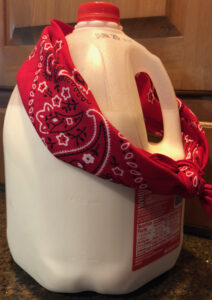
Grocery shoppers in St. Louis, Missouri, have begun making their choices, this Dairy Freedom Week, for the kind of milk they like best.
Red Team Milk and Blue Team Milk appeared, over the weekend, in separate refrigerated cases in six of the largest supermarkets in the region. The milk itself is neither red nor blue; it is all white, as usual. Only the packaging is different.
Monopoly Holdings of Wisconsin, a subsidiary of Monopolmarkt of Switzerland, is marketing and selling the “team” milks, flavored milks, creams, sour creams, ice cream, ice-cream bars and sandwiches, and cheeses as a way of getting consumers more “committed” to dairy products, a company spokeperson said.
Monopoly Holdings’ stock has dropped 38% since 2016, the result of private-label milk being used as a loss-leader in supermarket chains; of plant-based alternatives, such as soy and almond milks; of simultaneous outbreaks of Listeria monocytogenes, Salmonella, and E. coli in Monopoly Holdings’ corporate packing facilities, forcing the recall of all Strafverfolgungunterliegen product lines; and of course the recent downturn due to COVID-19 worries.
“We tried to convince consumers they should stock up on cottage cheese, the way they made a run on toilet paper,” a Monopoly Holding spokesperson said. “But the idea never went viral.”
The company is banking on the new campaign, “Choose a Side Once and For All,” to restore its fortunes in the buildup to the November election. One corporate officer, speaking on the condition of anonymity, said he believes people will buy two containers of their team’s milk, when they might only need one, just to spite the other team.
The branding does not stop with red or blue packaging. Each “team,” in addition to having its own location in the supermarket, has its own promotions, such as the co-branded offer for “Red Milk and Ding Dongs—The Perfect Pair,” or a digital coupon for 1% off if a shopper tweets, “Drink Blue—our purity means virtue for you!”
Shoppers on Tuesday evening could be seen peering into others’ carts to judge their product choices, and striking up conversations with like-minded milk drinkers. A scuffle occurred in Clayton after a shopper with a cart full of Blue Team products refused to let a Red Team shopper cut in line, despite his having only two items in his hand basket. The scuffle spread through the store and ended only after the state legislature promised to address in the next session the issue of some people trying to get ahead of others in line.
If the Team Milk branding is a hit, Monopoly Holding has plans to create proprietary convenience stores that will cater to the two sides of the divide they have helped to create. Lorenz Jansen, the Russian-born, American CEO of the Chinese-owned parent company of Swiss Monopolmarkt, says the conglomerate has been using focus groups to decide offerings in the stores.
“Red Stores obviously will sell Red Team Milk to consumers too busy in ‘the new normal’ to stop at a supermarket,” he says. “But while there, they will also be able to buy Patriot Chips™, ammunition in popular sizes, political ballcaps, and EchoChamber™ magazines from the racks.
“Blue Stores will carry not only Blue Team Milk, but also FairTrade Pies™ hot from conflict-free oil, t-shirts with cutting social messages, and gift cards for access to podcasts they can really get onboard with.”
“Americans have decided they do not want to share in anything,” Jansen said. “We see an opportunity in that and hope to exploit it. It’s the American Way.”
(Satire)
